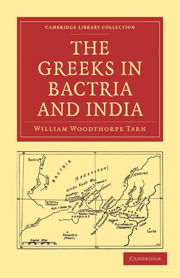Book contents
- Frontmatter
- Contents
- Prefaces
- Abbreviations
- Introduction
- PART I (INTRODUCTORY): THE BACKGROUND IN THE MIDDLE EAST
- PART II BACTRIA AND INDIA
- Chapter III EUTHYDEMUS AND BACTRIA
- Chapter IV DEMETRIUS AND THE INVASION OF INDIA
- Chapter V ANTIOCHUS IV AND EUCRATIDES
- Chapter VI MENANDER AND HIS KINGDOM
- Chapter VII THE NOMAD CONQUEST OF BACTRIA
- Chapter VIII GREEKS AND SACAS IN INDIA
- Chapter IX THE GREEKS AND INDIA
- CONCLUSION
- Excursus. The Milindapañha and Pseudo-Aristeas
- Appendix 1 Monograms and find-spots
- Appendix 2 The names in -ηνη
- Appendix 3 Agathocles' pedigree coins
- Appendix 4 The Yuga-purāna of the Gārgī Samhitā
- Appendix 5 Demetrius in the Hāthigumphā inscription of Khāravela
- Appendix 6 Alexandria of the Caucasus and Kapisa
- Appendix 7 Antiochus IV and the temple of Nanaia
- Appendix 8 A sealing from Seleuceia
- Appendix 9 Ki-pin (Kophen) and ‘Arachosia’
- Appendix 10 Ta-yuan
- Appendix 11 Chorasmia
- Appendix 12 Ormuz: a lost kingdom
- Appendix 13 Σάγαλα ἡ καὶ Εὐθυμέδεια
- Appendix 14 The supposed Oxo-Caspian trade route
- Appendix 15 The Oxus question to-day
- Appendix 16 The Era of the Moga copperplate from Taxila
- Appendix 17 The Hermaeus-Kujula Kadphises coins
- Appendix 18 San and Rho
- Appendix 19 Pāndava-Pāndu and Pāndhya
- Appendix 20 The Chinese sources
- Appendix 21 The Greek names of the Tochari
- Addenda
- Addenda (1950) to the Second Edition
- General Index
- Index of Principal Greek and Latin Passages
- Plate section
Chapter III - EUTHYDEMUS AND BACTRIA
Published online by Cambridge University Press: 10 November 2010
- Frontmatter
- Contents
- Prefaces
- Abbreviations
- Introduction
- PART I (INTRODUCTORY): THE BACKGROUND IN THE MIDDLE EAST
- PART II BACTRIA AND INDIA
- Chapter III EUTHYDEMUS AND BACTRIA
- Chapter IV DEMETRIUS AND THE INVASION OF INDIA
- Chapter V ANTIOCHUS IV AND EUCRATIDES
- Chapter VI MENANDER AND HIS KINGDOM
- Chapter VII THE NOMAD CONQUEST OF BACTRIA
- Chapter VIII GREEKS AND SACAS IN INDIA
- Chapter IX THE GREEKS AND INDIA
- CONCLUSION
- Excursus. The Milindapañha and Pseudo-Aristeas
- Appendix 1 Monograms and find-spots
- Appendix 2 The names in -ηνη
- Appendix 3 Agathocles' pedigree coins
- Appendix 4 The Yuga-purāna of the Gārgī Samhitā
- Appendix 5 Demetrius in the Hāthigumphā inscription of Khāravela
- Appendix 6 Alexandria of the Caucasus and Kapisa
- Appendix 7 Antiochus IV and the temple of Nanaia
- Appendix 8 A sealing from Seleuceia
- Appendix 9 Ki-pin (Kophen) and ‘Arachosia’
- Appendix 10 Ta-yuan
- Appendix 11 Chorasmia
- Appendix 12 Ormuz: a lost kingdom
- Appendix 13 Σάγαλα ἡ καὶ Εὐθυμέδεια
- Appendix 14 The supposed Oxo-Caspian trade route
- Appendix 15 The Oxus question to-day
- Appendix 16 The Era of the Moga copperplate from Taxila
- Appendix 17 The Hermaeus-Kujula Kadphises coins
- Appendix 18 San and Rho
- Appendix 19 Pāndava-Pāndu and Pāndhya
- Appendix 20 The Chinese sources
- Appendix 21 The Greek names of the Tochari
- Addenda
- Addenda (1950) to the Second Edition
- General Index
- Index of Principal Greek and Latin Passages
- Plate section
Summary
Had the story of the Bactrian Greeks survived, it would be considered one of the most remarkable of a remarkable time; but though it was treated by two Greek historians of the Farther East (Chap. ii), nothing has come down to us directly but some fragments and scattered notices and the coins. And there is not even the help which can be got in India from Indian literature and inscriptions and from archaeological research; nothing seems known of any native Bactrian literature at this period, and though the brief Chinese account of the country is invaluable China did not get into touch with Bactria till Greek rule had just ended. Moreover, the situation of the country, which to-day forms the northern part of Afghanistan, has always precluded archaeological research. There is said to be a certain amount of archaeological material in the museum at Tashkent, but if so it has never been made available to European scholars generally. A French archaeological mission was able to visit the upper Kabul valley in 1923, and permission was obtained for a brief visit to Balkh; a trench was sunk in a mound believed to represent the citadel of Bactra, but it got no further down than the fifteenth-century city, the Balkh of the Timourids. The ruin mounds on the plain of Balkh are said to extend for 16 miles, and the excavation of Bactra alone would occupy many years; that of Susa has been going on for over a generation, and it was not till 1928 that Greek inscriptions began to be found.
- Type
- Chapter
- Information
- The Greeks in Bactria and India , pp. 71 - 128Publisher: Cambridge University PressPrint publication year: 2010

